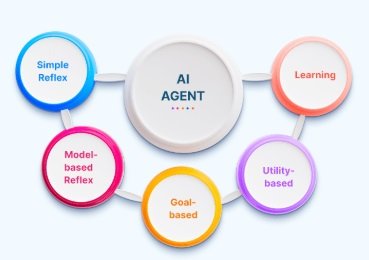
The business landscape is on the brink of a monumental transformation, driven by the rapid adoption of generative AI technologies. According to Deloitte, AI agents—intelligent systems capable of managing complex tasks with minimal human intervention—are poised to revolutionize industries like software development, healthcare, and customer service. By 2027, nearly half of the companies investing in generative AI plan to implement these smart systems, marking a significant shift in how businesses operate.
What Are AI Agents?
AI agents are autonomous systems designed to interact with their surroundings and perform specific tasks. They operate using three main components:
- Sensors – To collect information from their environment.
- Control Centers – To process data and make decisions.
- Effectors – To execute actions based on the processed data.
These systems function independently, enabling them to perform a wide range of activities. As technology continues to evolve, AI agents are expected to handle increasingly sophisticated tasks, such as real-time traffic management or personalized education delivery.
Applications Across Industries
The potential applications of AI agents span across diverse industries, bringing efficiency and innovation.
- Software Development: AI agents can automate routine coding tasks, streamline debugging, and even assist in creating software prototypes.
- Healthcare: These systems could revolutionize diagnostics, assist in patient management, and analyze medical data to predict health trends.
- Customer Service: AI agents can enhance customer experience through real-time query handling, personalized responses, and proactive issue resolution.
Advantages of AI Agents
The adoption of AI agents promises transformative benefits for businesses and industries:
- Bridging Skills Gaps: AI agents can take on specialized tasks, reducing the need for extensive human expertise.
- Enhanced Productivity: With the ability to process and analyze vast amounts of information quickly, AI agents can solve complex problems at scale.
- Fostering Innovation: By automating routine processes, these systems allow organizations to focus on strategic initiatives and creative problem-solving.
Potential Risks and Concerns
Despite their advantages, AI agents come with challenges that businesses must address to ensure their ethical and effective use:
- Technical Issues: Errors in decision-making or system vulnerabilities can disrupt operations and compromise security.
- Ethical Concerns: Autonomous decision-making without human oversight raises questions about accountability and fairness.
- Job Displacement: The increasing reliance on AI systems could lead to workforce reductions and societal disruption.
Mitigating Risks: A Path to Responsible AI Implementation
To harness the potential of AI agents while minimizing risks, businesses need to adopt a balanced approach:
- Transparency and Human Oversight: Maintaining a clear understanding of how AI systems function and ensuring human involvement in critical decision-making processes.
- Ethical Guidelines: Establishing standards to protect privacy, ensure fairness, and hold systems accountable for their actions.
- Data Security: Implementing robust cybersecurity measures to safeguard sensitive information.
- Public Education: Raising awareness about AI’s capabilities and limitations to foster trust and prevent over-reliance.
Summing Up
AI agents represent a significant leap in technological innovation, offering the potential to reshape industries and redefine the future of work. However, their successful integration requires careful planning, ethical considerations, and proactive measures to address potential risks. As businesses embrace this transformative technology, balancing innovation with responsibility will be the key to unlocking its full potential.
By 2027, AI agents are set to become an integral part of the business ecosystem, driving productivity, efficiency, and innovation across sectors. The question is no longer whether companies will adopt AI agents but how effectively they will navigate the challenges to leverage their capabilities for sustainable growth.

